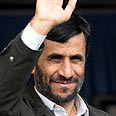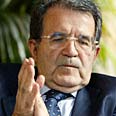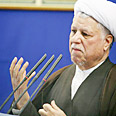


Ahmadinejad: Ready to consult with Italy on Mideast issues
Iranian president sends letter to Italian Premier Prodi day after France, Italy and Spain presented Middle East peace initiative, asserting that Europe must step forward to try to end years of Israeli-Palestinian bloodshed. Meanwhile, former Iran leader urges Bush on 'axis'
The letter, delivered to Prodi by an Iranian diplomat, comes a day after France, Italy and Spain presented a Middle East peace initiative, asserting that Europe must step forward to try to end years of Israeli-Palestinian bloodshed.
In talks with Iranian Deputy Foreign Minister Saeed Jalili, Prodi and Foreign Minister Massimo D'Alema welcomed Iran's wish to participate in Middle East dialogue. But the Italian officials warned that Iran must take a positive role and use its influence to help stabilize the region, the premier's office said.
D'Alema said during a news conference later Friday that Iran's desire for dialogue was positive, but would have to be "Measured against the facts."
During the meeting with Jalili, the Italian officials asked that Iran comply with the international community's requests on Tehran's contentious nuclear program and criticized Ahmadinejad's repeated calls to destroy Israel, he said.
Such behavior "does not seem coherent with this affirmed readiness to contribute to the region's pacification," D'Alema was quoted as saying by Italian news agencies ANSA and Apcom.
Italy has traditionally had good relations with Iran and is Tehran's leading trading partner in the European Union.
Prodi met with Ahmadinejad in September on the sidelines of a UN meeting.
Some Western leaders have been leaning more on Iran to participate in peacemaking in the Middle East while continuing to pressure Tehran over its nuclear program and its backing of Palestinian terrorist groups and Lebanon-based Hizbullah.
On Monday, British Prime Minister Tony Blair urged the international community to engage Iran and Syria to advance the peace process in the Middle East and Iraq.
The United States has said it was willing to hold direct talks with Iran about Iraq - which would be the most public exchange between the countries in years. But the United States does not want to discuss broader subjects such as the nuclear program, which Washington suspects is aimed at making weapons.
Rafsanjani to Bush: Remove Iran from 'axis of evil'
Meanwhile, Iran's former president urged President Bush on Friday to remove the Islamic republic from his so-called "axis of evil" and warned Washington not to consider military intervention in his country.
Hashemi Rafsanjani, the Iranian president between 1989 and 1997 and now the head of the Expediency Council that mediates between the parliament and ruling clerics, said Bush "made a strategic mistake. He should exclude Iran from the circle (axis of evil) that he has made."
Bush used the term in his 2002 State of the Union address to describe Saddam Hussein's Iraq, Iran and North Korea, states he said sponsor terrorism and seek weapons of mass destruction. Saddam was toppled the next year following a U.S.-led invasion, but autocratic governments remain in place in the other two countries, and both have nuclear programs that alarm the West.
Secretary of State Condoleezza Rice said late last month that recent events in Iran and North Korea support Bush's claim that they were part of an "axis of evil."
"It was a pretty good analysis, wasn't it?" Rice said when asked about the comment in an Oct. 24 radio interview. "It really was."
She said Iranians deserve a better leader, referring to the current hard-line President Mahmoud Ahmadinejad. She also predicted the UN Security Council will approve sanctions against Iran over its disputed nuclear program "in the next few weeks."
Iran said recently that it would be willing to talk to the United States about Iraq and other regional issues if the US requested it. But the White House has said it will only talk to Iran if Tehran agrees to suspend its suspect uranium enrichment activities. Iran has refused to do so, insisting its nuclear program is peaceful.
The US and its European allies are negotiating with Russia and China over a draft UN Security Council resolution that would penalize Iran for its refusal to halt enrichment by an Aug. 31 deadline amid fears it is trying to develop atomic weapons. Russia and China have extensive trade with Iran and are opposed to harsh sanctions.
Iran has shrugged off threats of sanctions, insisting that the West eventually will have to agree to negotiate with it.
"In the nuclear case, a difficult encounter is ahead of us," Rafsanjani said during Friday prayers in Tehran. "It will be difficult for the US, too. The United States should not pin hope on its veto right in the U.N. Security Council. It is not an angel for them; it is only a temporary solution."
Rafsanjani also warned the US not to consider military intervention in Iran, saying Washington's "iron fist policy" has failed.
"It will be dangerous if the US thinks that it can behave toward Iran in the same way that it has treated Afghanistan and Iraq," he said. "Any nation should respect rights of other nations. Today, negotiations, prudence and wisdom are the solution for the problems in the entire world."
The former Iranian leader played down the effect on Iran of the US midterm elections that gave Democrats control of Congress.
"Democrats are a little bit softer, but they are not angels. Do not interpret the win of either parties as very significant," he said.
During his speech Friday, Rafsanjani did not mention an Argentine judge's request for his arrest and the detention of eight other officials for the 1994 bombing of a Jewish cultural center in Buenos Aires. The blast killed 85 people and wounded more than 200. Iran's charge d'affaires in Buenos Aires has said the judicial case was "fraught with irregularities" and politically motivated.















